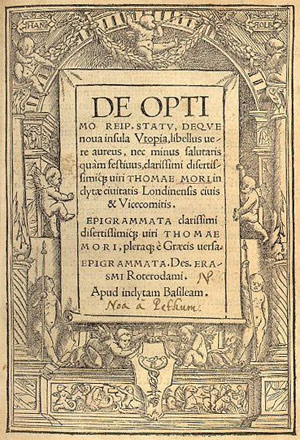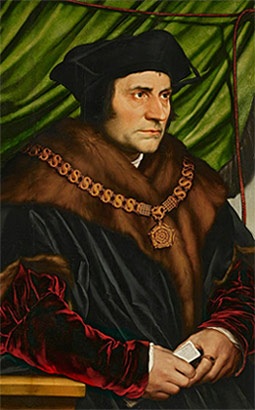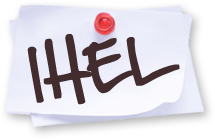Utopia:
BASIC FACTS:

Title: Utopia
Author: Thomas More
Date of composition: 1515-16
Date of publication: 1516
Setting(s): Utopia (New World, fictional island)
Language/dialect: Latin
Genre: It is a narrative depicting a fictional island.
Type of narrator: Utopia is composed of two books. In book I, the narrator is Thomas More, who becomes a character in the narrative; he is a first person narrator. In book II the narrator is also a character, Raphael Hythloday, also a first person narrator.
Subgenres: Fiction and political philosophy.
Plot summary: The book consists of two parts. In the first one, More begins with a written correspondence between Thomas More and several people. Here, Raphael Hythloday is also introduced and the characters discuss topics such as philosophy, politics and economics.
In the second part, Thomas More describes various features of Utopia, including status, social organisation and governance: work, family, war, education, religion, economy, slavery, philosophy. Also, other important issues such as divorce, euthanasia and death are commented on.
Even though More concludes that some of the Utopian customs are absurd, he does acknowledge that he would like to see some of the aspects of their society reflected in England.
FURTHER INFORMATION:
Major themes:
Utopia is a veiled criticism of the British society of the 16th C and the aspects criticised are reflected in the main topics of the two books that compose it.
In book I we find three main topics:
- The first one is the role of intellectuals in society. More reflects on whether intellectuals should take part in politics by giving advice to rulers or not.
- The second topic is the system of justice in London, which More considers to be corrupted.
- Finally, the third theme is the legitimacy or illegitimacy of kings to use the crown to expand their territory.
In book II the most important topics are:
- Organisation of society: the whole of book II is a description of Utopian society. It describes each detail of how it is organised and every other topic that appears in the text is subordinated to this topic.
- Equality: it is a key issue for Thomas More; everybody should be equal and have equal rights. He describes Utopia as a perfect society and to construct that image of perfection he uses symmetry.
-
Justice: it is related to equality, as justice has to be equal for everyone. More makes an indirect critique of the judicial system of his time.
- Politics: it is also an important issue. The author describes a representative democracy, the people elect their rulers and this is also a veiled critique against the British system.
-
Other important topics that are dealt with in Utopia are: private property, moral education of citizens, slavery, marriage and war.
Main characters:

More: In the story we find a character with the same name as the author, however we cannot identify this character with the author because he is not transparent. More will travel to Antwert to meet Peter Giles and Raphael Hythloday. Thanks to Hythloday he will discover Utopia, a land where a lot a strange things can be found in relation to More’s time, such as divorce or euthanasia.
Raphael Hythloday: He is a traveller who has been living in Utopia for five years. He will explain all the mysteries of Utopia to Peter and More from the issues of religion, to army or even how they organise their daily work.
Secondary characters:
Peter Giles: He was an actual historical figure of Sir Thomas More’s time, and he helped More to publish Utopia. However, this character cannot be taken seriously because the author uses him for his own purposes to create different situations.
General Utopus: He was a warrior who arrived a long time ago to Utopia and imposed a new way of living. He changed the name of the island and created the Republic of Utopia, but it is not a republic because we find a lot of limitations. Utopia is more similar to a dictatorship.
Symbols:
More makes use of some symbols that help him to describe his Utopian society. The first and possibly most important symbol is the island itself. Utopia is an island because this perfect society has to be isolated, without external influences that could contaminate it. Besides, in making Utopia an island, More makes a connection to Great Britain, the place where he wanted to see those Utopian customs put into practice.
The shape of this island is that of crescent moon; according to psychoanalytic criticism it could represent a woman’s womb, a place of safety and a symbol of rebirth.
The island is surrounded by water which is also a symbol, the Christian symbol of life. Water gives life and cleans impurities. Utopia is a prosperous land and it has plenty of water, it is the blessed country.
Another important symbol in Utopia are gardens. The garden is an important image and symbol in medieval literature and it conveys two meanings: the first one is of evil and failure, the loss of the Garden of Eden and the other one of happiness and of being close to nature, and therefore close to God. As in Utopia the main activity is agriculture, and its inhabitants are mostly farmers, they are near nature and subsequently near God.



